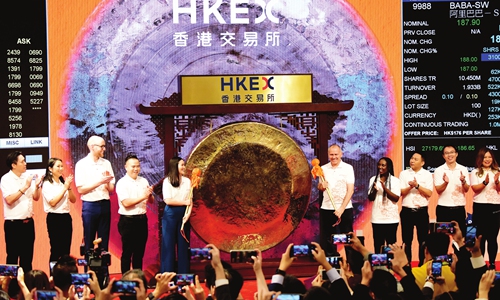Homecoming of US-listed Chinese companies becomes pace-setting in 2020
Source:Global Times Published: 2020/6/9 16:16:08

Chinese e-commerce giant Alibaba Group Holding Ltd. makes a strong debut on the main board of the Hong Kong stock exchange on November 26, 2019, with its share price rising 6.59 percent on the first trading day. Ten partners from around the world attend the listing ceremony. Photo: Xinhua
The homecoming of US-listed Chinese firms has set a new pace in the equity market this year, a British investment management firm's China portfolio manager said Tuesday, hailing the recent flurry of Hong Kong listings as a significant step enabling Chinese investors to buy shares of Chinese high-tech firms.
Over the past month or two, the homecoming of Chinese firms has gained traction in the wake of a raft of US regulatory remarks targeting Chinese stocks traded on the US market, Lynda Zhou, equity portfolio manager of London-based Fidelity International, told a video press conference.
The Trump administration has been tough on US-listed Chinese firms. In his presidential memoranda Thursday, Trump set a 60-day deadline for recommendations on ways to clamp down on US-traded Chinese firms not abiding by US accounting standards.
Relisting in Hong Kong rather than staging a comeback directly in the Chinese mainland market is a more realistic approach for those mainland companies, analysts said.
A legal arrangement known as a variable interest entity (VIE), prevalently used by US-listed Chinese firms, means relisting in the mainland market would entail a lengthier process than listing in Hong Kong, according to Zhou. Under a VIE structure, an investor can have a controlling stake despite not having a majority of voting rights.
A speedier IPO process in the Hong Kong market where IPO pricing is attractive for investors makes Hong Kong a more efficient fundraising destination compared to the mainland market, said an investment banking analyst with a Chinese joint-stock bank on condition of anonymity.
In Zhou's words, domestic investors that have long been inaccessible to US-traded new economy heavyweights would be offered increasing opportunities to reap gains from the new economy majors.
She reckons that as a free and open economy with a robust financial system, a freely convertible currency and a respectable legal regime, Hong Kong will remain a significant Chinese window to the outside world despite short-term political uncertainties.
A recent example of interest in the city's market is JD.com's stock offering of its secondary listing in Hong Kong beginning on Monday. It is reportedly multiple times oversubscribed by both institutional and retail investors.
Market watchers also expect mainland shares to pick up steam as, buoyed by a global rally led by US stocks, the Chinese economy's rebooting and stepping up reformist drives to align the mainland equity market with its global counterparts.
Emerging markets, especially the A-share market that has been underpinned by China's proven efforts to revive its economy from the coronavirus fallout, would be increasingly eyed by global investors seeking safe havens, Zhou says.
US stocks have largely recouped their losses from the coronavirus rout, with the NASDAQ hitting an all-time closing high on Monday.
Zhou cited plans to introduce same-day trade settlement (T+0), subject to a single transaction per day, lately revealed by the mainland regulatory authorities as a major incentive to lure global investors.
Mulling a more viable alternative to the benchmark Shanghai Composite Index that has remained at levels from a decade ago could preclude a genuine bull run, the Shenzhen-based investment banking analyst told the Global Times.
The Shanghai Stock Exchange revealed on Friday that it has created an index compilation expert advisory mechanism.
China's tech-heavy ChiNext index has bounced back over 20 percent from its low in March as of Tuesday's close, entering bull-market territory in technical terms.
Global Times
Posted in: MARKETS